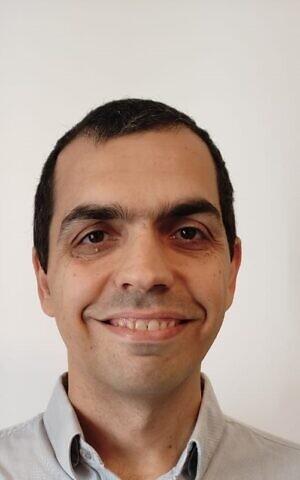Dr. Oren Heller, an Israel-based researcher for Washington University. (Courtesy: Dr. Oren Heller)
Study finds low-income Israelis who recovered from severe or acute infection have averaged 3.3 symptoms per person, while higher-income Israelis average just 1.8 symptoms each
By NATHAN JEFFAY
Long COVID hits poorer people far more widely than those who are wealthier, new Israeli research has found.
A study counted the number of long COVID symptoms suffered by people who recovered from severe or acute infection. It found that the poorer respondents averaged almost double the number of symptoms than the wealthier respondents.
Low-income Israelis who have recovered averaged 3.3 symptoms, while higher-income Israelis averaged 1.8 symptoms, according to the research project by academics from Ben Gurion University, Washington University in St. Louis, and several other institutions.
While the study didn’t measure the severity of the symptoms, the researchers deemed the quantity of the symptoms a good-enough indicator, especially given the big difference found and the statistical significance of the results.
Long COVID symptoms cover a wide spectrum and include fatigue, concentration and memory problems, muscle pain, sleeping problems and mental health issues.
The academics surveyed 2,200 Israelis about their health and observed the clear trend on socioeconomic lines among those who had recovered from the coronavirus.
“It’s well known that infections affected poorer people worse than others, and now this research shows that long COVID also disproportionately affects them, which is an important finding,” Dr. Stav Shapira of Ben Gurion’s University of Health Sciences told The Times of Israel.
She said it has long been observed that the lifestyles of poorer people and the environment they face disadvantage their health, and the research shows this effect is hitting hard in long COVID terms. Shapira commented: “This really emphasizes the extent to which social determinants in health are important.”
Long COVID hits poorer people far more widely than those who are wealthier, new Israeli research has found.
A study counted the number of long COVID symptoms suffered by people who recovered from severe or acute infection. It found that the poorer respondents averaged almost double the number of symptoms than the wealthier respondents.
Low-income Israelis who have recovered averaged 3.3 symptoms, while higher-income Israelis averaged 1.8 symptoms, according to the research project by academics from Ben Gurion University, Washington University in St. Louis, and several other institutions.
While the study didn’t measure the severity of the symptoms, the researchers deemed the quantity of the symptoms a good-enough indicator, especially given the big difference found and the statistical significance of the results.
Long COVID symptoms cover a wide spectrum and include fatigue, concentration and memory problems, muscle pain, sleeping problems and mental health issues.
The academics surveyed 2,200 Israelis about their health and observed the clear trend on socioeconomic lines among those who had recovered from the coronavirus.
“It’s well known that infections affected poorer people worse than others, and now this research shows that long COVID also disproportionately affects them, which is an important finding,” Dr. Stav Shapira of Ben Gurion’s University of Health Sciences told The Times of Israel.
She said it has long been observed that the lifestyles of poorer people and the environment they face disadvantage their health, and the research shows this effect is hitting hard in long COVID terms. Shapira commented: “This really emphasizes the extent to which social determinants in health are important.”
Long COVID is proving a serious challenge both to recovered patients and to health systems.
Israeli research published recently found that among adults who catch COVID-19, one in three fails to return to pre-infection health levels even months later. Another Israeli study found that long COVID is dealing a serious blow to the sense of well-being for millions around the world.
The latest research helps doctors, nurses and policymakers to understand the extent to which socio-economic factors can exacerbate it — therefore helping them plan in which neighborhoods and communities to deploy extra resources.
“Policy-wise, our research indicates you need to target specific population groups and build infrastructure to deal with the expected health burden,” said Shapira.
“Policymakers should focus on specific groups. In Israel, this means giving special attention to the geographical periphery, such as the Galilee and Negev, where incomes are lower. Other countries will have their own priority areas.”
Dr. Oren Heller, an Israel-based researcher for Washington University in St. Louis and one of the other authors of the study, said that it points to accumulating layers of health inequality.
“In general, poorer people suffer from more health issues,” he told The Times of Israel. “So what we saw here is that low-income people started the pandemic less healthy than others, got infected more, and now face more issues from long COVID.”
Shapira, Heller and their collaborators published their peer-reviewed article in the International Journal of Public Health. They wrote that long COVID is proving very hard to treat because it is so widespread, because it is an “evolving phenomenon” and because it involves very varied symptoms. But they stressed that it “can significantly degrade quality of life and wellbeing.”
The researchers suggested that it presents long-term challenges for health systems as “there is growing evidence that long-COVID may be related to underlying damage to major organs including the lungs, heart and cardiovascular system, liver, kidneys and brain.”
They argued that with millions affected worldwide, as the world transitions to an ethos of living with COVID, understanding long-COVID and what factors exacerbate it “is an increasingly urgent public health concern.”
